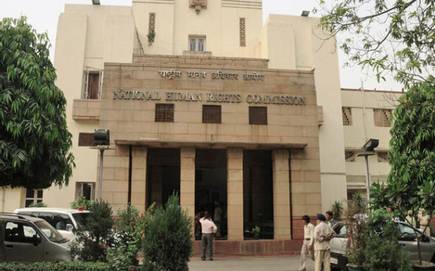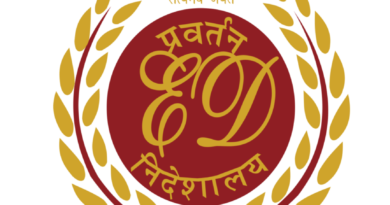NHRC intervenes in Suo motu Case before Supreme Court on Plight of the Migrants; urges SC to implement Long Term & Short-Term Measures mentioned in I.A.
(Judicial Quest News Network)
The Supreme Court today allowed (NHRC) to file the intervention application Commission in the Suo moto case concerning the plight of the migrant workers stranded in different parts of the Country amid the Covid-19 induced lockdown.
NHRC purports to examine the laws governing the protection of human rights of migrants and suggest measures to ensure the same are not compromised.
The I.A mentions that “the instant application for intervention is being filed on behalf of National Human Rights Commission (hereinafter referred as ‘commission’), India that has been set up by an Act of the Parliament under the Protection of Human Rights Act, 1993 for the Protection and promotion of Human Rights. Section 12 of the act lays down the functions of the commission, including among others, to intervene in any proceedings involving any allegation of violation of human rights pending before a court with the approval of such court and also to review the safeguards provided by or under the Constitution or any law for the time being in force for the protection of human rights and recommend measures for effective implementation.”
The three Judge bench of Justices Asohk Bhushan, Snajay Kishan Kaul, and Mr.MR Shah allowed the intervention plea today. After an extensive hearing lasted for an hour the Supreme also reserved its order in the matter, which is scheduled to be delivered on June 9.
The NHRC submits that looking into various newspaper reports and media reports showing the unfortunate and miserable condition of the migrant workers it has taken suo motu cognizance of the issue and has issued notice to various government departments in all 6 matters till date.
It is further contended that “A key piece of legislation governing the inter-state migrant workers is the Inter-State Migrant Workmen (Regulation of Employment and Conditions of Service) Act, 1979. The Inter-State Migrant act was enacted to regulate the employment of inter-state migrant workmen and to provide for their conditions of service and matters connected thereto so as to prevent exploitation of inter-state workmen by contractors and to ensure fair and decent conditions of employment. The said act requires that all establishments hiring inter-state migrants to be registered and contractors who recruit such workmen be licensed. Under the act migrant workers were entitled to wages similar to other workmen, displacement allowance, journey allowance and payment of wages during the period of journey for the migrant workers.
The NHRC, thus, seeks short term as well as long term measures that may be considered by the top Court to ensure that the basic human rights and fundamental rights of poor migrant workers are not violated.
- Short term measures:
- In order to estimate the in-flow of migrant workers, States should collect the data of migrant workers at the point of departure in the originating State as well on arrival in the destination States. This will help States to effectively plan quarantine and relief measures for the migrant workers.
- ii. The Government of India and the State Governments must ensure proper implementation of the Inter-State Migrant Workmen (Regulation of Employment and Conditions of Service) Act, 1979 so that the migrant workers are provided with a journey allowance.
- iii. Menstrual hygiene products should be provided to migrant women and adolescent girls across the country. For example, at the Andhra-Odisha border in Odisha’s Ganjam district, the women and adolescent girls among migrant workers walking homeward on the NH16 have received menstrual hygiene products, along with food and other relief material, from Youth for Social Development (YSD), an NGO.
- iv. Each state should be directed to ensure proper functioning of shelter homes especially for the accommodation of pregnant women, lactating mothers, children, and elderly persons. It should be ensured 9 that medical facilities and nutritious food are available in these shelter homes.
- Each State should be directed to identify the industry in which the migrant labour is working i.e construction, agriculture, brick kiln, etc. This identification will aid the State in creating schemes for the migrant workers and in the preparation of a State-wide and Nationwide database.
- States should be directed to take steps for the support of migrant workers, similar to the steps taken by the State of Odisha which has set up a toll-free Shramik (labour force) Sahayata Helpline, Migrant Labour Help Desk, seasonal hostels for the children of migrant workers, and has strengthened Anti-Human Trafficking Units for migrant workers.
- States must ensure medical facilities for check-ups for migrants before and after the journey, as well as availability of food and medical care during the journey. For migrants who are walking or travelling on bicycles, food and water should be made available both at the originating and destination states, as well as en route.
- The originating States should take steps to identify the destitute among the migrant labour and provide some quantum of compensation to ensure that they do not resort to begging after reaching their destination.
- It is of concern that as per many reports 40 per cent of the Shramik trains are late, there is an average delay of 8 hours. Railways in consultation with the respective State Governments should ensure that such delays do not take place and the trains do not reach wrong destinations. A mission similar to that of the dedicated Vande Bharat 10 Mission should be started in a phased manner to help migrant workers reach their source destination.
- A fund should be created for payment of ex-gratia relief by the concerned DM, which will provide fixed compensation to every migrant returning home.
- Long Term Measures:
i.A special provision to be inserted in the Inter-State Migrant Workmen (Regulation of Employment and Conditions of Service) Act, 1979 to deal with emergency situations like Covid-19, natural disasters etc.
ii. Appointment of a claim commissioner to look into recovery from employers who abandoned their labourers despite notification for continuity of wages by Central Govt. For example it appears prima facie that the provisions regarding Accommodation as provided for under the Building and Other Construction Workers (Regulation of Employment and Conditions of Service) Act, 1996 have been ignored by the employer thus leading to a situation where the workers had to resort to travelling back to their home State.
iii. Allocation of funds to states to be allotted to gram panchayats in order to create employment opportunities in the home states of migrants.
iv. National portal for registration of migrants so that a nationwide database is created. 11
v. Compensation to family members of those who died while migrating to their respective states.
vi. Universal ration card to be granted to migrants vii. Maximum benefits be extended to the migrant labour as provided for under the Unorganised Workers’ Social Security Act, 2008.
viii. The government announced it would launch a scheme for affordable rental housing for migrant workers and urban poor to provide ease of living by converting government-funded housing in cities into Affordable Rental Housing Complexes (ARHC). This would be carried out through PPP mode. This should be implemented as soon as possible in order to provide shelter to the migrants.
ix. There should be a nodal agency created under the Ministry of Labour for the resolution of inter-state migrant labour issues. The Secretary from each State/UTs should be a part of this nodal agency and will coordinate with the migrants in their respective states. A study looking at best practices from other countries on issues concerning migrant labour could be commissioned in order to implement or adapt the same in the domestic context.
- A simpler registration process ensuring the understanding capability of the migrant workers. Also, the forms should be made available in the local language or the language that is most commonly used in the area.
- The Application was filed through Advocate Mohit Paul and NHRC was represented by Senior Advocate BS Patil
Senior Advocate Prabhu Patil expressed the NHRC’S Desire to intervene in the matter.
While arguing the matter Solicitor General Tushar Mehta stated that the same could wait, as they were long term solutions and the Court was Currently concerned with the present situation.
On this Patil submitted that the NHRC adversarial and willing to help.
The Bench reserved its Orders on the Suo Motu matter and will deliver the same on Tuesday, June 9.
[Read Application]
[Read Final Application]




